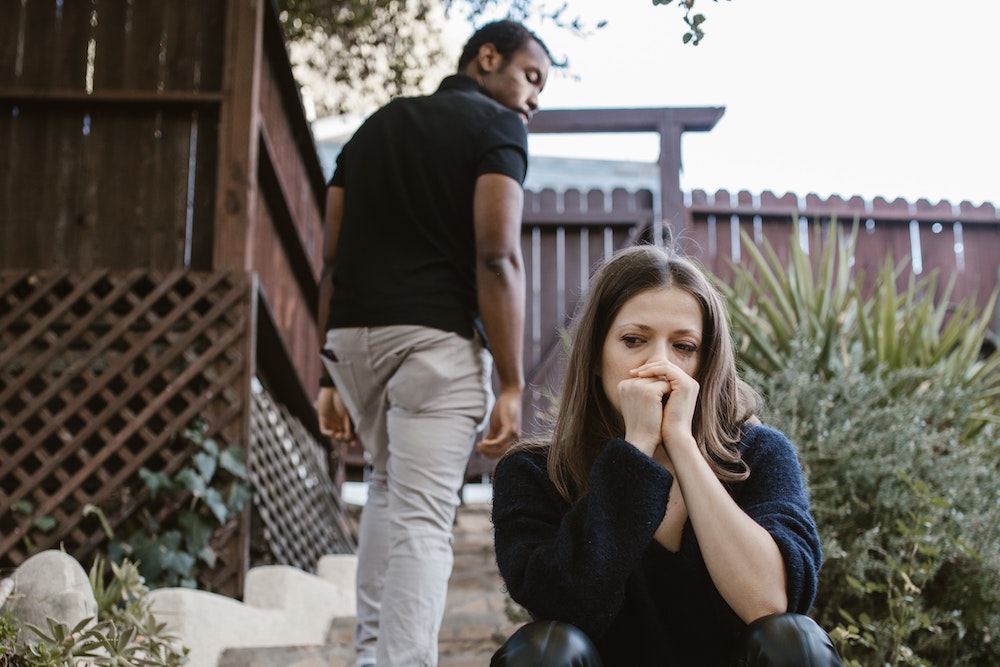Update: So many of us are struggling with how to move on from a toxic relationship and heal from the pain. Listen to Dr. Shannan Crawford and author Brenda Crouch Deep talk about how to break free from trauma, pain, wounds, bitterness, abuse. A short list of how we are plagued in our minds to give up, increase self-doubt, and maintain bad thought patterns. Brenda Crouch, author, TV host, speaker, and singer, joins us to elaborate on how that wasn’t the original design. There is hope and healing waiting for you. It is a journey. It will take you some time. You are loved and there is hope for you.
First, let me start by saying, this is not going to be easy! However, we all have a protector, a provider, a redeemer, the one and only savior, a Father in Heaven who cares for you and me, and HE, Jesus, can help you through the difficult days, weeks, and months ahead. It’s a difficult journey, but today we will be talking about how to move on from a toxic relationship and heal from the pain.
“My God will meet all your needs according to the riches of His glory in Christ Jesus.”
Philippians 4:19
So, What Defines a “Toxic Relationship”?
A toxic relationship is any relationship where there is conflict, competition, no support for each other, disrespect and a lack of cohesiveness.
Everyone deserves a healthy relationship. If everyone had the same personality, same likes and dislikes, same style of completing day-to-day responsibilities, there would never be any conflict, right? Maybe, but it would also be a pretty boring world too if we were all exactly the same! Instead, we have all been created as unique individuals, with unique personalities, likes and dislikes, and ways to deal with things.
We are influenced by our surroundings, our moods, our past, and our believes. We are all created in the image of God though, and therefore we have the right and more importantly, the ability, to have healthy relationships. We have the right to research how to move on from a toxic relationship and heal from the pain.
“God created mankind in His own image, in the image of God He created them; male and female He created them.”
Genesis 1:27
While all relationships are hard, some relationships are more difficult and require an extraordinary amount of work. Sometimes, these relationships seem to have spiraled out of control, and if not corrected, have the ability to be extremely harmful to our own well-being. It’s important that we know how to move on from a toxic relationship and heal from the pain.
A toxic relationship is characterized by behaviors that are emotionally and/or physically damaging to one or more people.
- While a healthy relationship builds your self-esteem, a toxic relationship can damage your self-esteem and even at times, drains you of your energy.
- A healthy relationship is safe, and is characterized by compassion, respect, and mutual caring. It includes an interest in the other person’s well-being and growth, and the ability to share control and decision-making.
- A healthy relationship is defined as one in which each person cares for the other’s happiness.
- On the other hand, a toxic relationship is not a safe place. It is filled with self-centeredness, insecurity, dominance, and control.
However, it takes two people to have a “toxic relationship” One person alone, or acting alone, is not a relationship. Therefore, it is important to consider that each person in the relationship is responsible for their own words and actions. It is common for each of us to want to look at the actions of the other person first. Nevertheless, we must look hard at our own actions and words in the relationship as well.
Read more about how to move on from a toxic relationship and heal from the pain.
Even healthy relationships can have hard times
Even a healthy relationship can have bad days, or short periods of time where the behaviors of one or more in the relationship could be labeled toxic. We are all human beings, and therefore far from being perfect. The Bible says it this way: “For everyone has sinned; we all fall short of God’s glorious standard.” Romans 3:23.
And very few people have had formal training on how to relate with others. There are not many classes taught in schools about having the perfect, healthy relationships. This is something that often has to be learned as we grow. And if we didn’t have “perfect” parents, and very few of us did, then we will likely not be perfect ourselves every day. We all do have a perfect role model though, and the more we learn from Him, the more we try our best to become like Him, and thus, the better our relationships will be.
Always be humble and gentle. Be patient with each other, making allowance for each other’s faults because of your love. Make every effort to keep yourselves united in the Spirit, binding yourselves together with peace.
Ephesians 4:2-3
When the toxic behavior is part of the normal routine; the day-to-day pattern of behavior for the relationship; then the relationship has become dysfunctional and inappropriate. If one or more person in the relationship regularly engages in controlling or manipulating behavior, it is considered toxic. So it’s important to seek help with how to move on from a toxic relationship and heal from the pain.
Here are some examples of inappropriate, toxic behavior in any relationship:
1.The “Belittler“
This form of toxic behavior is characterized by an individual who will constantly put you down, or belittle you. He or she may make fun of you, and imply that anything you say is silly or stupid. This type of individual will often tell you that you are lucky to have them as a friend or to be in a relationship with them, and that no other man or woman would ever want you. They seem to have a goal of making your self-esteem as low as possible, so you don’t challenge the control they have.
2. The “User”
At the beginning of the relationship, a user will be very nice and courteous. But that personality will change if they stop getting their way. A toxic relationship with a User will appear to be a one-way relationship, and you will never seem to be able to do enough for the other person.
3.The “Woe is me” person
This person is always complaining about something, or more realistically, everything. They don’t know when to call it quits.
4.The “Bad temper” individual
If you are dealing with this personality, you, friends, and family, may have given up on trying to disagree with this person because they get angry, or looses his or her temper too easily. Once this happens, it takes a day or two for any communication attempt to be made again. It is not uncommon that this behavior is never seen by the general public.
To those whom do not experience the behavior, this individual will come across as pleasant and easy-going. However, within the relationship, a person with a “bad temper” will almost always blame their temper outburst on you. Somehow, it is your fault that they yell or scream. This disowning of the responsibility for their behavior is typical for a toxic person.
5. The Overreactor/Deflector
If you have ever tried to tell someone that you are unhappy, hurt, or angry about something they did and somehow find yourself taking care of their unhappiness, hurt, or anger, you are dealing with an overreactor or deflector. You will find yourself comforting them instead of getting comfort yourself. And sometimes when you try to talk about what made you unhappy, hurt, or angry, somehow, they find a way to make it your fault.
For example, if you were waiting on a friend who promised to come pick you up for dinner, but never called to change the plans to another night. And when you spoke to the friend about it, somehow it was your fault they never called or showed up, this friend might be a deflector. They may say something like “You are too sensitive”, or they make a statement such as “But you love me still”.
These are just a few examples of a toxic relationship. In addition, any relationship involving physical violence or substance abuse is extremely toxic and requires immediate attention.
Remember that every relationship will on occasion have examples of toxic behavior. The key to whether it is a toxic relationship or not, is the severity of the behavior, and the frequency. If the characteristics are part of the normal day-to-day, and not just an occasional problem that can be talked about and addressed, then chances are, you are in a toxic relationship.
Read on for how to move on from a toxic relationship and heal from the pain.
So, what do you do if you have determined you are in a toxic relationship?
You cannot change another person. All you can do is change yourself.
- First, you calmly but firmly confront the toxic behavior. You do this by identifying the behavior that is inappropriate; letting him or her know that it is no longer acceptable, and suggesting an alternative behavior that would work better.
- Second, you have to believe you deserve to be treated with courtesy, compassion, and respect in any relationship. Without these expected behaviors in a relationship, you will need to make it clear that you will not continue the relationship.
- Third, anticipate that when you first confront someone on their toxic behavior, it is almost assuredly that they will escalate their controlling behavior.
- Fourth, stay calm, firm, and simply repeat your request. You will need to be able to handle whatever reaction they respond with.
- Remember YOU cannot change another person. That is up to them, so if the other person in your relationship refuses to change, consider separating from the relationship for 30 days. You should then talk with them again, repeat your requests, and let them know that you will not stay in a relationship that is not built on compassion, love, and respect.
- Before, during, and in between each and every step, it is very important to be in prayer about the process, each person in the relationship, and the desired result.
- If after the 30-day separation the other person in the relationship still refuses to change, you need to consider ending the relationship. Note: If you are married, and in a toxic relationship, the Bible gives two clear grounds for divorce: 1) Sexual immorality (Matthew 5:32; 19:9) and 2) Abandonment by an unbeliever (1 Corinthians 7:15). However, it is also important to note that Confession, forgiveness, reconciliation, and restoration are always the first steps, and divorce should only be viewed as the last resort.
How to heal from the pain of a toxic relationship
Once you have determined you are in a toxic relationship, and you make the difficult decision to move on, it is important to next begin thinking about your healing. Likely the behaviors you have been dealing with have been going on for some time, and it will take you awhile to grieve, and heal. Just like if you break your leg, it takes time to heal and return to being able to move freely again; similarly, it takes time to heal your heart and mind from the pain of any kind of trauma. Healing is a process and will not occur overnight.
First, realize that the result of a toxic relationship is often the loss of many things, including self-confidence, self-worth, physical health, and even at times relationships and safety. Your healing will need to include boundary-setting, as well as surrounding yourself with safe people. As you become more aware of the impact the toxic relationship has had on you physically, mentally, and spiritually, you can begin the restoration process.
The Bible gives us 21 verses about God’s restoration.
Our Father is in the business of restoration (healing or repairing). Here are a few examples:
Restore to me the joy of your salvation and grant me a willing spirit, to sustain me.
Psalms 51:12
But those who hope in the Lord will renew their strength. They will soar on wings like eagles; they will run and not grow weary; they will walk and not be faint.
Isaiah 40:31
For I know the plans I have for you, “ declares the Lord, “plans to prosper you and not to harm you, plans to give you hope and a future.
Jeremiah 29:11
Surround yourself with friends and family that will help you focus on becoming strong and healthy again. People who love and care about you, will be by your side as you begin regaining your joy. Realize that you may lose some people in your life during this process, but you will also create new, healthier relationships along the way. Learn to trust yourself again and believe that you can return to “normal”. And finally, seek help through support groups and trained professionals who specialize in recovering from toxic relationships, abuse, depression, as well as grief.
The Lord himself goes before you and will be with you; He will never leave you nor forsake you. Do not be afraid; do not be discouraged.
Deuteronomy 31:8



